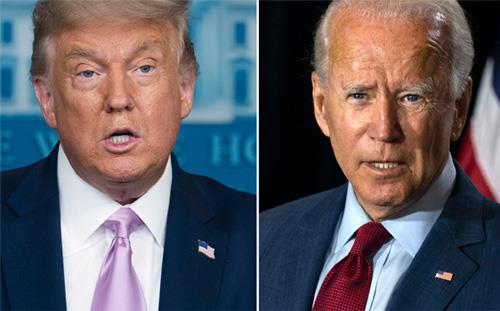
Even PBS is having trouble finding neutral journalistic middle ground in this year's presidential election.
This is not good news.
Every election year since 1988, PBS's Frontline has presented a pre-election special called The Choice, comparing and analyzing the Democratic and Republican candidates. It's not billed as a voters' guide, but that's obviously its primary value.
The Choice 2020: Trump vs. Biden airs Tuesday at 9 p.m. ET on PBS (check local listings), and if viewers are looking for a program that treats each candidate primarily as a vessel for a set of ideas, this isn't it.
The first segments, exploring the childhoods of Republican Donald Trump and Democrat Joe Biden, set the tone.
Trump, Frontline strongly suggests, was raised by a cold, bullying father to be a cold bully. Fred Trump, Donald's father, is presented as rich, distant, and demanding.
Fred's older son, Fred Jr., rejected that life, but couldn't find an alternative. He died young and, by implication, unhappy.
Donald, on the other hand, did everything he could to emulate and please Fred. Whether he ever did seems to be an open question, but Frontline says he totally bought into the idea that the only salient question in any human interaction is "What's in it for me and how do I get it?"
This is hardly the first time Donald Trump has been portrayed this way. Nor is there any indication it bothers his many followers. In fact, Trump fans likely feel that applying this transactional philosophy to America – what's in it for us? – is exactly what we need in a competitive world.
But those same followers are unlikely to think a documentary that features people like Mary Trump – the niece who recently wrote an unflattering book about Donald – is giving their guy a fair assessment.
Meanwhile, after painting Trump as a lifelong bully, Frontline frames Biden as a kid who was the victim of bullies and overcame them.
Biden stuttered as a child, which subjected him to the cruelty of other children, and some teachers as well. Politics, Frontline suggests, was one of the avenues he pursued in his battle to overcome the speech impediment and be accepted.
From there, The Choice takes the candidates into their adult years and finishes with their visions for America. It's a good summation, following the things that Trump did as a builder, a TV host, a celebrity, and president. It distills Biden's half-century in politics, including the controversies.
Still, certain themes permeate the chronology.
Biden generally comes across as a regular guy and a fighter, someone who overcame a personal handicap and a series of terrible personal tragedies.
Trump comes across as a man who has used money and position to run roughshod over anyone who opposed him, as well as a number of people who worked with him and, at some point, were no longer considered useful.
Every profile of a politician has to bring personality into the discussion. In this case, personality too often seeps in far enough to overshadow the less flashy stuff, like policy.
None of this means Frontline has gotten anything wrong, or has set out to present a partisan argument. It does give this year's Choice less of a focus on the issues and more of what we get everywhere every day: Do you like this guy or not?
The Choice is less reassuring, particularly this year, than we would like it to be.